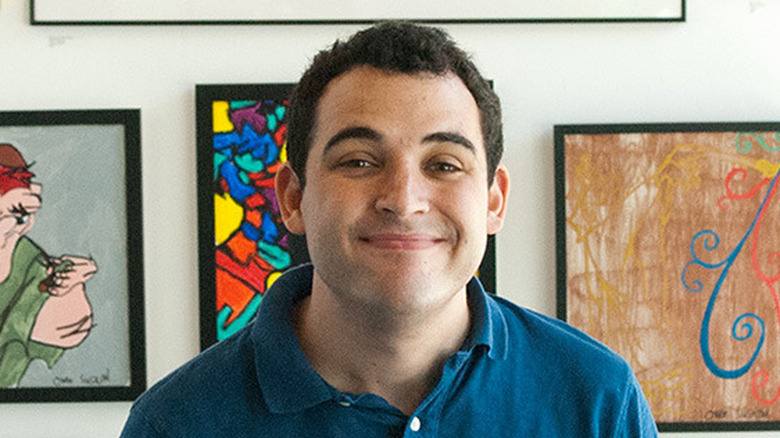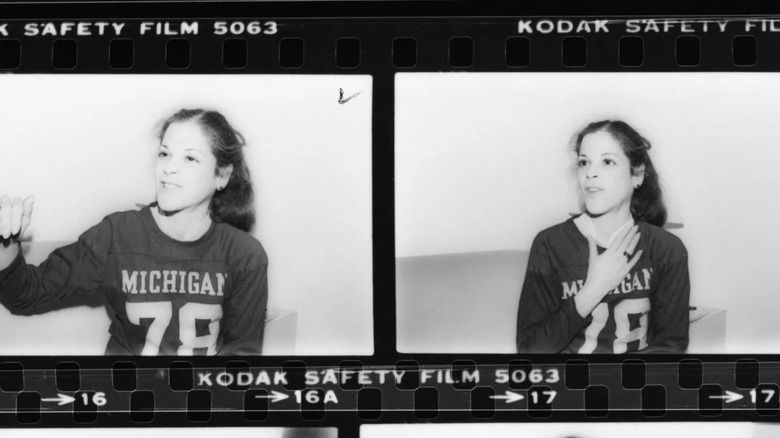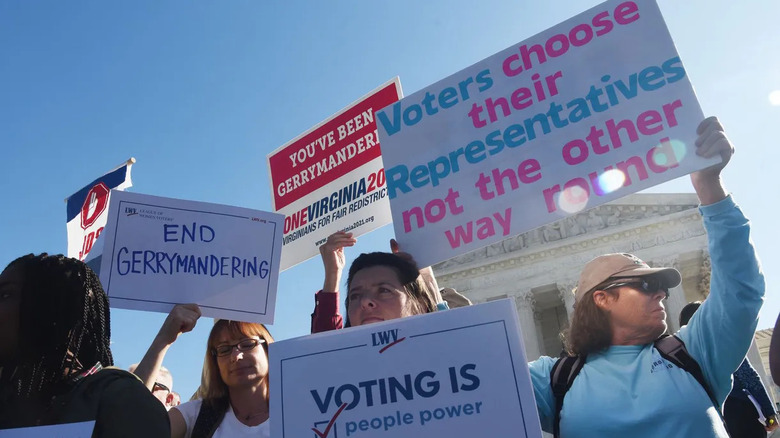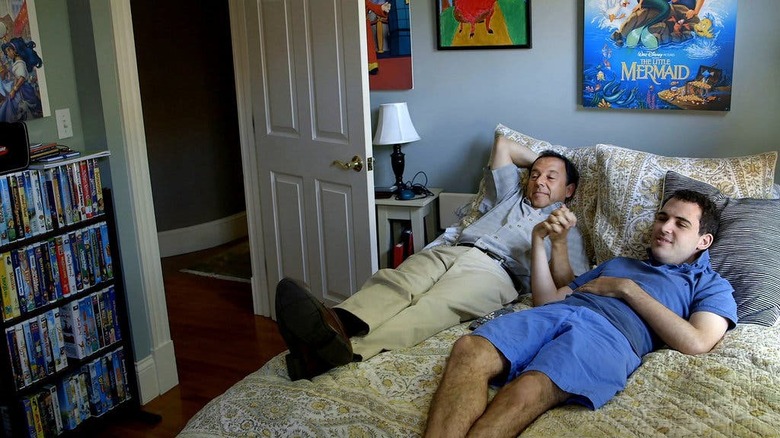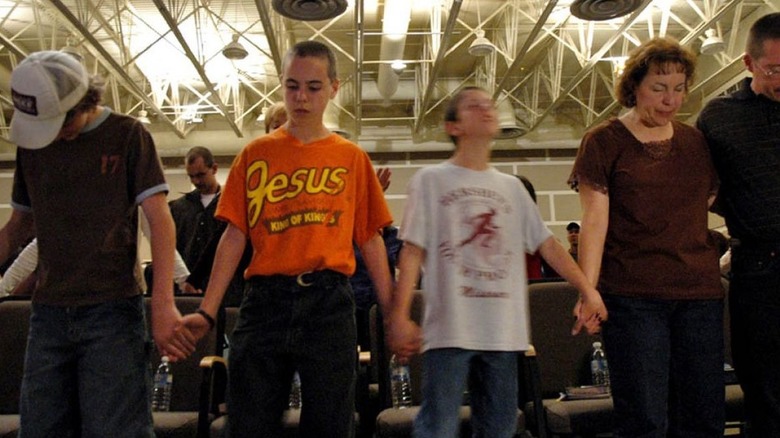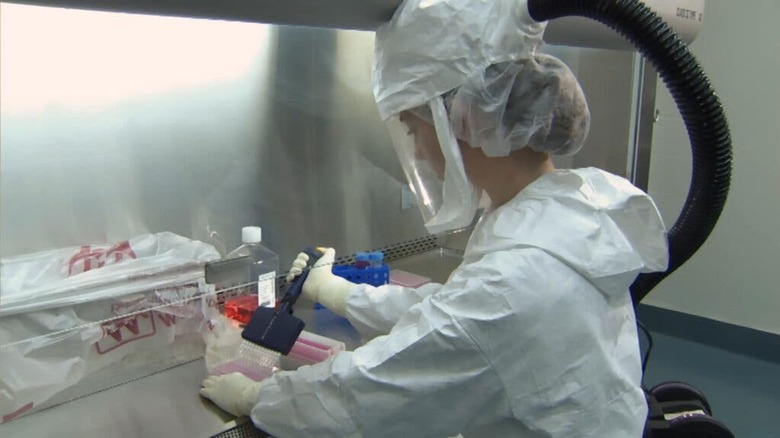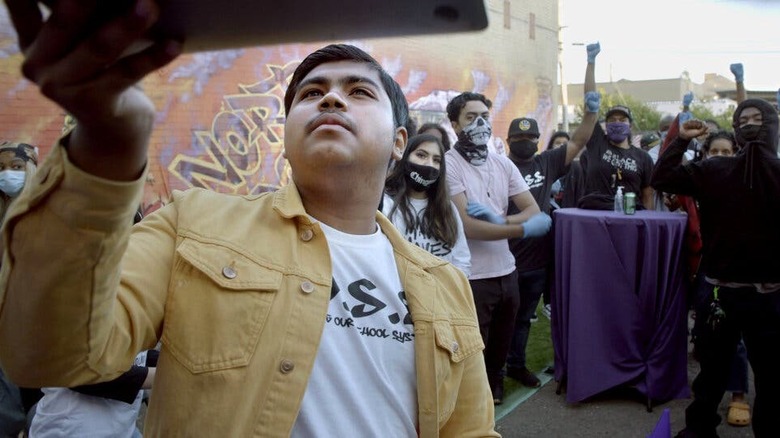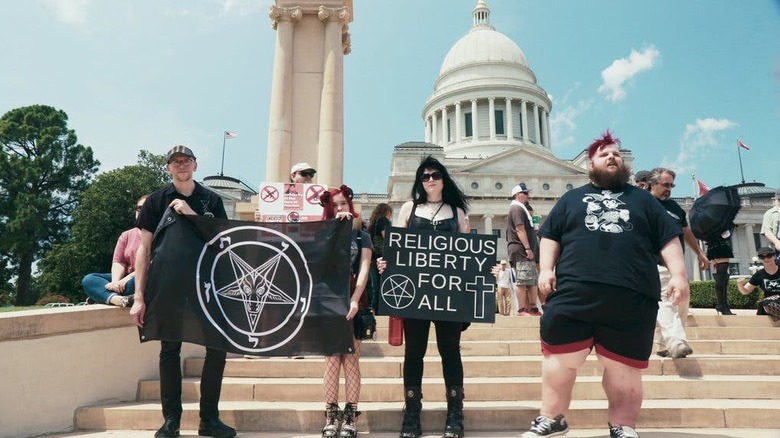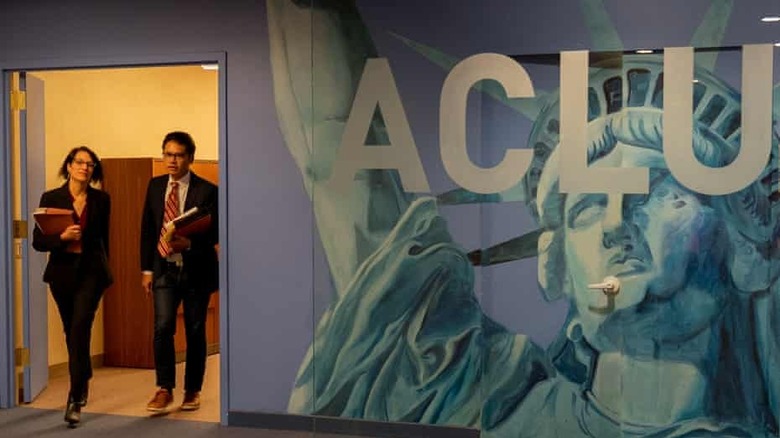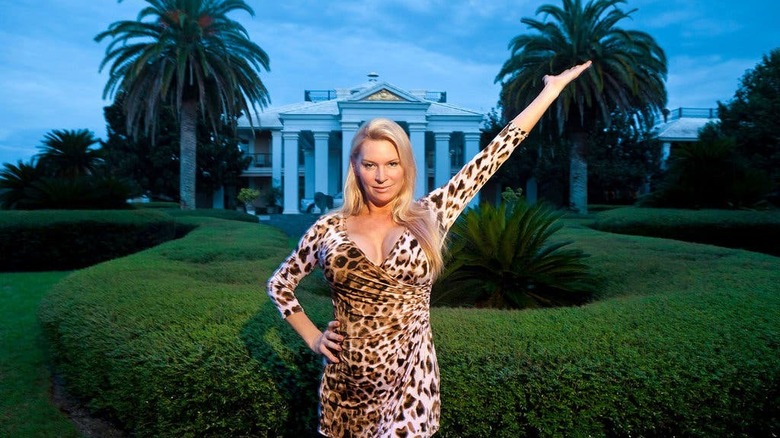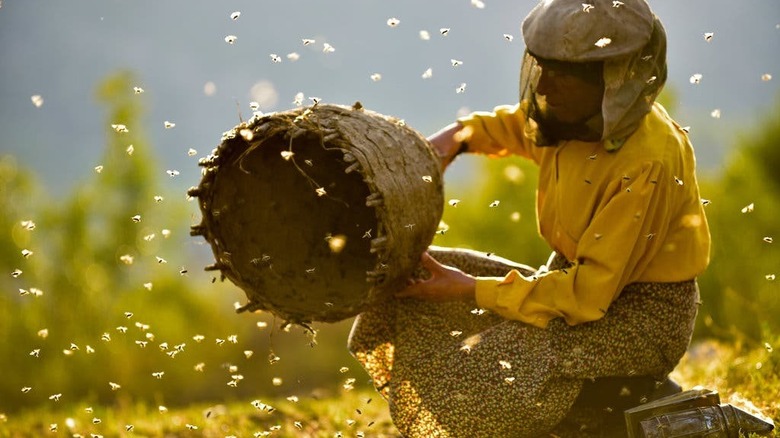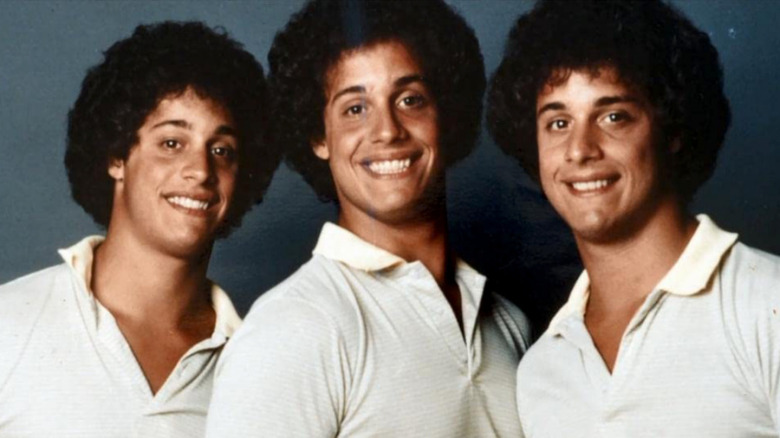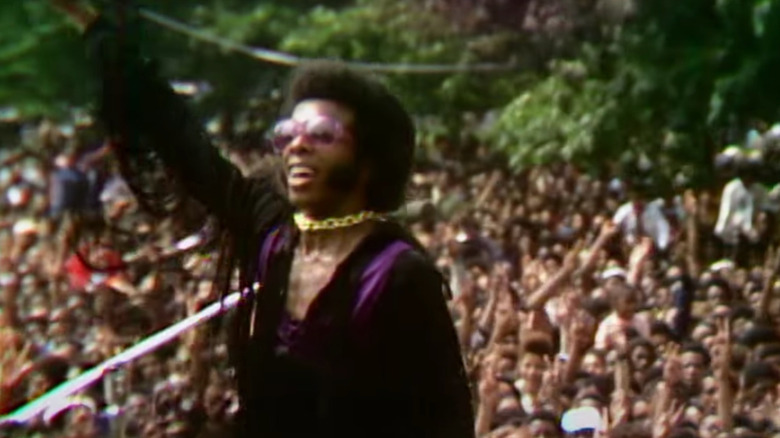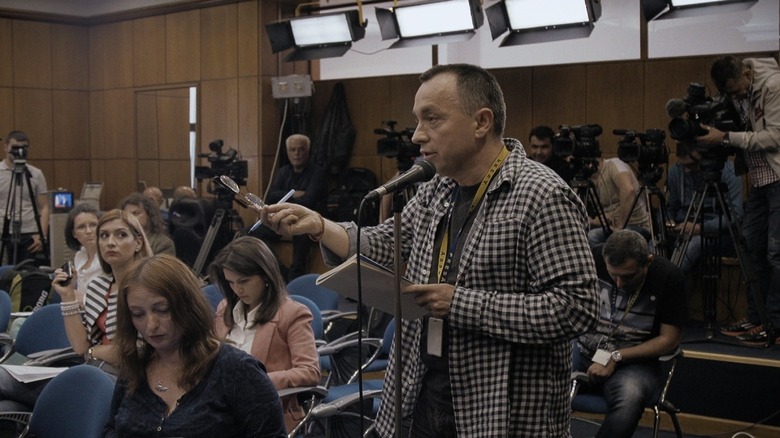The 14 Best Documentaries You Can Watch On Hulu Right Now
Back in the day, it wasn't easy to see documentaries unless you lived in a major metropolitan area with an arthouse cinema, or they were of the Ken Burns variety on PBS during a pledge drive. How many major theater chains routinely make space for non-fiction films? But one of the main benefits of streaming is that there's suddenly room for so much content, and viewers have the opportunity to see not just the biggest franchise blockbusters, but lower-budget documentaries that otherwise might have been consigned to oblivion.
If you look at the best documentary feature nominees even as recently as the early 2010s, there are maybe one or two that the average moviegoer would have seen (or even heard of), but little more than that. Over the past few years however, they're almost all available on streaming services. Hulu especially has developed a reputation for cultivating a strong lineup of documentaries, raising the profile of the genre and making it more accessible than ever before.
14. Love, Gilda
Of the many cast members of "Saturday Night Live" who have come and gone over the years, perhaps none were as beloved as Gilda Radner. She was there from the very first season as an original "Not Ready for Prime Time Player" on what was then referred to as "NBC's Saturday Night," and she was one of only three female performers cast on the show. "Love, Gilda" is a documentary from director Lisa Dapolito that allows Radner to speak for herself, using audio clips, diaries, and home movies from before her death from ovarian cancer at the age of 42.
The result is poignant and undeniably charming: these brief moments where she is brought back to life, combined with interview footage both from people who knew her and the women who would follow in her footsteps at "Saturday Night Live," provide precious insight into the groundbreaking comedian's inner life.
13. Slay the Dragon
Have you ever wanted to go see a documentary, but only if you're guaranteed to leave apoplectic with rage? "Slay the Dragon" might just be the doc for you. Created during the unstable (well, more unstable than usual, anyway) years of the Trump administration, "Slay the Dragon" shines a light on the insidious and anti-democratic practice of gerrymandering, where districts are contorted into odd shapes that will allow an unscrupulous political party to dilute their opponents' voting power.
In it, we discover how blatantly this practice has been abused in certain Republican-controlled states, consolidating their authority even when it doesn't necessarily match up with the majority of the voters in the region. But it also provides some source of hope as it highlights the efforts from local citizens' groups to ban gerrymandering, fighting against all odds to preserve democracy in a country where many would see it dismantled to preserve their power.
12. Life, Animated
When Owen Suskind was just three years old, he began to withdraw from the world, experiencing a form of late-onset autism that would see a happy, outgoing toddler retreat into a state of silence. "Life, Animated" details his family's incredible story, as Owen learns how to connect emotionally through the use of Disney films. At first, he only reacts to impersonations of the characters, but gradually his world expands, with the stories in these films helping him process physical and emotional stimuli, preparing Owen for a life that extends beyond his beloved animated classics.
Based on the best-selling book by Owen's father, a Pulitzer Prize-winning journalist, "Life, Animated" depicted an uplifting true story of life with autism, and spoke to the magical power of cinema. It was nominated for best documentary feature at the Academy Awards in 2017, only narrowly being edged out by "OJ: Made in America."
11. The Donut King
Just why are there so many donut shops in California owned by Cambodian immigrants? It might seem like a coincidence, but its actually the direct result of one man, Ted Ngoy, and his efforts to help out his fellow countrymen (as well as making a veritable donut empire on the West Coast.) He's called "The Donut King," and this is his story. After emigrating to the United States to flee the Khmer Rouge, Ngoy took a variety of jobs, including one at a donut shop. With hard work and sacrifice, he rose up the ranks, and eventually bought his own shop.
One shop was followed by several others, and he was soon in a position to sponsor other Cambodian immigrants and lend them the capital to buy in, selling donuts under his umbrella. "The Donut King" operates partially as a biopic of Ted Ngoy, showing both the enterprising spirit and the crippling gambling addiction that would ultimately bankrupt him, but also as an exploration of the Cambodian immigrant experience.
10. Jesus Camp
Over the past two generations, the American Evangelical church has exploded in both number and influence. Once a fringe movement, now a slightly less fringe movement with annoyingly real political power. And part of that growth comes from the kind of indoctrination we see in "Jesus Camp," the story of a Christian summer camp and the children that were sent to it. The goal of this camp, grounded not in arts and crafts and swimming in the lake but constant devotionals, is to ensure that the kids involved have no space in their small, over-stimulated brains for anything but Jesus.
It's heartbreaking to watch the fear and anxiety that lurks beneath the surface of the seemingly happy, faithful children, fighting a private, internal battle to avoid damnation and eternal hellfire. "Jesus Camp" shows the dark side of an allegedly loving religious organization, where innocent kids are taught to fervently believe that God loves them ... almost as much as he wants to punish them.
9. Totally Under Control
Directed by Alex Gibney (who has made something of a career out of documentary exposes such as "Going Clear: Scientology and the Prison of Belief" and "Agents of Chaos" about Russian intervention in the 2016 U.S. elections) in the midst of the pandemic, "Totally Under Control" is a staggering achievement — not only the fact that they were actually able to make this film under strict social distancing conditions, but that they were able to have such a nuanced, dynamic understanding of the pandemic so early on. In a way, that makes it all the more frustrating.
Because "Totally Under Control," more than anything else, is a searing indictment of the Trump administration's incompetence and even malfeasance in its handling of the COVID-19 policy. And if a group of documentarians was able to get the sort of statements that are in this film on the record from public health officials just months into the pandemic, that means their ineptitude was infuriatingly obvious. It's a fascinating watch, even when it's incredibly frustrating: it is, after all, interesting to learn that it's possible to make exactly the wrong decision every step of the way when dealing with a crisis.
8. Homeroom
A classic example of a filmmaker letting the course of events dictate the narrative of their documentary rather than the other way around, "Homeroom" goes in unexpected directions, thanks to the influence of COVID-19 in the latter part of the film. The passionate, activist-minded senior class of 2020 at Oakland High School are in the midst of a furious battle to have police officers removed from their campus. The presence of cops for many minority and in some cases undocumented students is hardly conducive to education. They wage war against the school board, which repeatedly insists on their necessity for safety reasons, even as the budget sags under the weight of their high cost, preventing Oakland High School from funding academic and mental health programs for students.
But the world changes about three months before their graduation, as COVID-19 requires them to transition to remote learning. Despite this, they continue the fight, and the movement at their school merges with a larger demand for systemic change across the nation, as widespread Black Lives Matter protests surge around the end of their senior year. "Homeroom" is messy, no doubt because of the constantly changing filming environment, but also shows a group of young people as representatives of their generation, determined to make the world better not just for themselves, but for everyone else.
7. Hail Satan?
Every few decades, there's a satanic panic, where conservative middle America types get all squirrely about the idea of Satanists in their midst, committing ritual suicide and sacrificing goats and playing loud rock music. "Hail Satan?" offers a different perspective of the Satanic Temple, an actual functioning organization, but one more focused on preserving the separation of church and state and protesting the privileges enjoyed by the Christian Right than making pacts with Lucifer.
Throughout the documentary, we see protests held by proclaimed Satanists to advocate for religious freedoms. But "Hail Satan?" never takes itself too seriously: It instead approaches its subject with a sense of mischievousness in line with the reputation the counterculture group enjoys. Witty, clever, and informational in a way that feels measured and open-minded, "Hail Satan?" presents an unexpectedly nuanced perspective on social justice reform and challenges to the current religious status quo that exists in modern-day America.
6. The Fight
In recent years, there has been an increased assault on civil liberties around the United States. For most people, the magnitude of these issues are difficult to wrap their minds around: They see an article about a new regressive social policy on Twitter, go into a brief rage spiral, and then carry on with their day. But for the lawyers at American Civil Liberties Union (ACLU), these are the battles they wage every day of their professional lives.
"The Fight" details the experiences of four different lawyers working on five cases that the ACLU is involved in, revolving around access to abortion, the rights of transgender soldiers, the Trump travel ban, reunification of immigrant families at the border, and protecting voters' rights by challenging the inclusion of a citizenship question on the census. "The Fight" is inspiring, but it's not a feel-good movie by any means. Each of the lawyers experiences a rollercoaster of highs and lows, occasionally gaining ground and frequently being met with unexpected challenges. But throughout "The Fight," it is an engaging, informative exploration of what actually goes into the legal battles that determine so much of our social structure.
5. The Queen of Versailles
In most documentaries, it tends to be a little bit easier if your subject can be framed as either a hero or a villain. That's not the case in "The Queen of Versailles," a film about Jackie Siegel and her husband, who are in the middle of building one of the largest single-family residences in the United States, modelled on the Palace at Versailles, when the Great Recession hits. The business that built their fortune on a predatory timeshare scheme is suddenly endangered.
They're the picture of ostentatious, arguably worthy of no sympathy from any quarter. But there's something about Jackie that makes it difficult not to feel something. Before she was the trophy wife of an aging businessman, as we learn from archival footage and interviews with former friends and family members, she was seemingly driven and full of life; a former model and Mrs. Florida America as well as the recipient of a Bachelor's degree in computer engineering from the Rochester Institute of Technology. Because of her presence, "The Queen of Versailles" becomes more than just an object of mockery, but something deeper and much more intriguing.
4. Honeyland
In parts of rural Macedonia, there are still those who utilize ancient beekeeping techniques, earning a meager living selling their honey during trips to the closest city. But in spite of their efforts to keep traditions alive, they are threatened by the inevitable destruction that modernity and capitalism bring along with them. Hatidže Muratova is one such beekeeper, who lives in the remote mountains of village of Bekirlija with her elderly mother for company.
When new neighbors move in nearby and express interest in beekeeping, she's happy to teach them. They're in pursuit of a quick buck and willing to cut corners, which will not only compromise their own livelihood, but Hatidže's as well. "Honeyland" is a quietly evocative story of the delicate balance that exists between humanity and nature, and the damage of disturbing that fragile relationship. In 2019, it became the first film to be nominated for both best international film and best documentary at the Academy Awards, no mean feat for a small environmentalist documentary.
3. Three Identical Strangers
Every once in a while, you hear about a pair of twins who were separated at birth and raised by two different families. Strange and fascinating, to think of two people so similar and so closely linked who are kept apart from one another. But the events of "Three Identical Strangers" are on a whole different scale. It's difficult to wrap your mind around the idea of triplets being purposefully separated at birth and distributed to three different sets of parents, each ignorant of the others' existence, and it's even harder to imagine the unethical researchers who would engineer such a situation.
Regardless, that is the reality of the three men highlighted in "Three Identical Strangers." It begins as a quirky experience reminiscent of "The Parent Trap," where the boys are confused for one another at college, only gradually piecing together the enormity of what had been taken from them. As children, they were part of a secret "nature vs nurture" experiment, a study that would end up defining their lives. The joy of discovering lost brothers would turn to tragedy, with each brother grappling with the scars of a life kept secret from them.
2. Summer of Soul
The same summer that Woodstock was making a legend for itself in Upstate New York, the Harlem Cultural Festival was making waves in New York City. Unlike the former, however, the Harlem Cultural Festival was considered not to have been particularly well-documented, especially given the caliber of performers it attracted. Held in Mount Morris Park, it featured performances from Stevie Wonder, Nina Simone, Gladys Knight and the Pips, and Mahalia Jackson, amongst many others. And until Questlove's documentary "Summer of Soul," it remained relegated to the scrap heap of pop culture history.
But TV producer Hal Tulchin had recorded about 40 hours of footage documenting the festival, videotape that would remain unseen by the general public for ages. "Summer of Soul" has value purely for archival purposes — it's incredibly important that people know that this festival took place, that there were massive crowds turning out to celebrate these artists in 1969. It goes beyond purely documenting the event, though. "Summer of Soul" evokes the spirit of the festival, combining this archival footage with modern interviews to capture a moment in time that we are so privileged to have back.
1. Collective
In 2015, a fire broke out at the crowded Colectiv nightclub in Bucharest, Romania. Twenty-seven individuals died that night, with another 180 injured. But here's the additional devastating part on top of the initial tragedy: An additional 37 people died after being sent to the hospital, even ones who had only relatively minor burns. The reason behind this is shocking, and lies at the heart of the damning expose in "Collective." Romanian hospital administrators, in an effort to save money, allegedly encouraged disinfectants to be dangerously diluted, inadvertently creating antiseptic-resistant bacteria that would fester in and ultimately kill their patients.
But this is just the tip of the iceberg: Abuse and neglect are shown to be heartbreakingly common in the hospital environment. "Collective" follows the idealistic new Minister of Health, Vlad Voiculescu, in his ultimately fruitless efforts to hold the perpetrators responsible and reform the entire system from the inside. It's a frustrating battle and a brutal indictment of widespread government corruption, one that is difficult to watch but utterly enthralling all the same.
